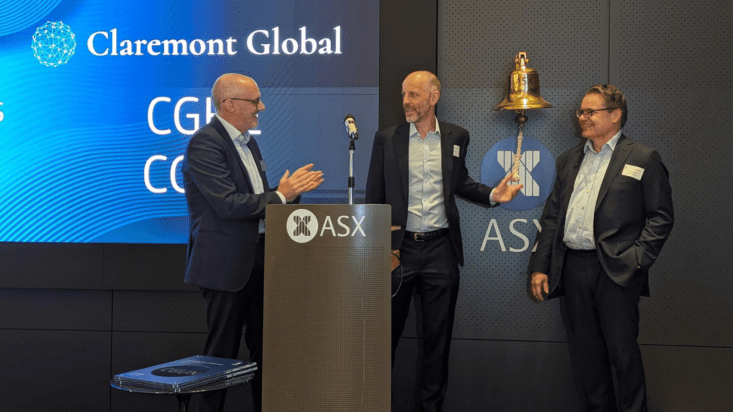Claremont Global lists active ETF versions of popular high conviction funds
High conviction investors Claremont Global have gone public with an active version of the $1.45 billion Claremont Global Fund, continuing the trend of successful funds broadening their reach out to the retail investment market through exchange-traded managed fund offerings.
The Sydney-based global asset manager team rung the bell at the ASX office on Bridge Street in front of investors Monday morning to mark the release of both the Claremont Global Fund (ASX:CGUN) and the hedged Claremont Global Fund (ASX:CGHE).
The original Claremont Global Fund was launched in 2014 and based on a high conviction investment strategy that involves ownership in a tight collection of high-quality company holdings, currently between 10 and 15. The stripped back approach has returned a remarkable 17 per cent per year average return (net of fees and assumed reinvestment of distributions) over the last 5 years, which sits at about 4.6 per cent above the benchmark for the period.
According to Claremont Global head of distribution Charlie Wapshott, ETFs are a natural choice as a vehicle for funds looking to expand their reach into the retail arena.
“Since 2020, funds under management in ETFs have nearly doubled while unit trust FUM has fallen by about 20 per cent over the same period,” Wapshott said.
Financial advisers are increasingly looking at ETF investments for their clients, Wapshott continued, with 45 per cent of all self-managed superannuation funds holding ETFs and over 2 million Australians now invested in them. “This is increasing at a rate of about 7 per cent year on year. Over the coming year over 50 per cent of ETF investors intend to make an allocation to international equity ETFs,” he added, citing betashares data.
The Claremont Global company selection process is a unique one that filters through over 70,000 global companies and narrows them down to 150 via proprietary quantitative techniques and exclusions. This list is then narrowed down to 40 “approved” businesses before 10 to 15 are chosen for inclusion in the portfolio.
According to head of Claremont Global and co-portfolio manager Bob Desmond there are also specific sector parameters that shape the global portfolio.
“We don’t participate in banks, pharmaceuticals, utilities, resources – basically anything that is leveraged, commoditised, overly complex or regulated,” Desmond said.
“Where we do invest is in essential non-leveraged financial services, well-established technology companies with proven business models, healthcare (but not pharmaceuticals), business service providers, niche high margin industrials and quality consumer brands. We look for dominant market positions, low cost to value customer propositions, an owner-managed culture, consistent earnings power, strong balance sheets and diversity in products and services.”











